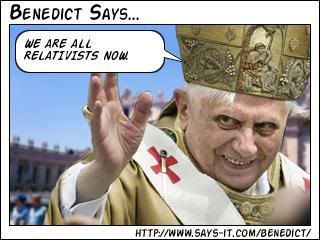SBS doco: "A War On Science"
2000 years ago someone died on a cross for us. Isn't it time we did something for him?That's one of the more chilling soundbites from the SBS Cutting Edge documentary on ID, "A War on Science," that screened last night. It's also a very good reason why, as the programme reported, members of the Dover school board were instructed by their legal counsel to keep their mouths shut during the recent trial that provided a backdrop for the programme's exploration of the ID phenomenon.
Overall, the documentary provided a useful general introduction to the claims of intelligent design and to the criticisms of those claims. Michael Behe and William Dembski were introduced as the caporegimes of a movement founded by lawyer Phillip Johnson and philosopher of science Stephen Meyer, and their key claims--Behe's "irreducible complexity" and Dembski's "specified complexity" (outlined in broader terms as a statistical refutation of random mutation and natural selection)--were presented as the twin pillars of that movement. The programme also pointedly made the connection between the courtroom defeat of the teaching of biblical creationism in the late eighties, and the coincidentally contemporaneous emergence of intelligent design. (Had there been time, I'm sure it would have detailed the "evolution" of creationist textbook Of Pandas and People into the NEW! IMPROVED! intelligent design editions--this certainly did not go unnoticed in Dover). The "Wedge Document" was mentioned, though the documentary noted that its release has not been detrimental to ID's popular appeal. The reality-based community was represented by David Attenborough and a scathing Richard Dawkins--who unfortunately offered little more than sound-bite rebuttals--with the actual killer blows to Behe's and Dembski's claims being struck by biologist Kenneth Miller, who demonstrated how the so-called "irreducible complexity" of the flagellum wasn't, and also how many events can be deemed statistically impossible if the odds of their occurring are calculated retrospecively.
Overall, the "War on Science" was represented not so much as a struggle between science and religion as a struggle between science and truthiness--Bush featured prominently as a sign of the powerful hold ID has on the American popular mind, even if its credibility among scientists is negiligible (and that's being generous). Although we all know the result in Dover, the documentary foreshadowed more battles to come--given the money and resources available to ID proponents. And here I feel the doco missed an opportunity to explore some of the sources of these funds--including among them organizations who believe homosexuals should be executed.
The "American Gothic" cinematography employed for the Dover, PA sequences was a nice touch--though I thought the "scary movie" atmospherics that accompanied accounts of the Dover school board meetings leading up to the trial a tad over the top. (Indeed, the doco often seemed to be suggesting something about ID proponents through the cinematography. Dembski was filmed repeatedly tossing dice--as befits a man who once famously boasted: "I'll wager a bottle of single-malt scotch, should it ever go to trial whether ID may legitimately be taught in public school science curricula, that ID will pass all constitutional hurdles." And Behe, who claims that the "irreducible complexity" of the bacterial flagellum is evidence against evolution, expounded his views from within an amusement park.)
It's a shame that good television like this gets buried on SBS--but then again with the fundie-friendly Federal Government tightening the screws on the ABC, it's probably just as well.

















|